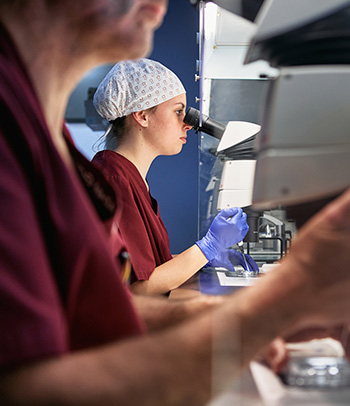If you’re struggling with infertility, you’re not alone. Millions of people around the world face the same challenge, and VA’s fertility services are here to support you.
If you’re struggling to build a family, you’re not alone. Large numbers of people are affected by infertility. According to research on infertility from the Pew Research Center, more than 42% of adults in the United States say they have used fertility treatments or personally know someone who has, and the rates continue to rise from year to year.
With so many people affected by infertility, it’s important to understand what infertility is, the many causes behind it, and most importantly, what high-quality, effective fertility treatments are available for those who want to become parents.
What Is Infertility?
Many experts define infertility as the inability for women over age 35 to get pregnant despite having frequent, unprotected sex for at least a year or six months. According to the Department of Veterans Affairs (VA), infertility is a condition characterized by any of the following:
- The inability to achieve a successful pregnancy as established by your medical, sexual, and reproductive history, age, physical findings, diagnostic testing, or any combination of these factors.
- The need for medical intervention, including but not limited to the use of donor eggs, donor sperm, or donor embryos to achieve pregnancy, either as an individual or with a partner.
What Causes Infertility?
According to Mayo Clinic, infertility may occur for several different reasons. It may be a health issue with either you or your partner, or it may be a mix of factors.
Male infertility may be caused by:
- Conditions that affect sperm quality or how much sperm is made, including medical conditions, genetic defects, infections like HIV, health problems such as diabetes, or enlarged veins in the scrotum.
- Problems with sperm reaching the female reproductive tract caused by certain genetic diseases like cystic fibrosis, sexual conditions like premature ejaculation, physical problems like a blockage in the testicle, or damage or an injury to the reproductive organs.
- Certain environmental factors, such as exposure to pesticides or other chemicals, medicines used to treat bacterial infections and high blood pressure, or repeated exposure to heat like in a hot tub or sauna.
- Damage related to cancer and its treatments, such as chemotherapy and radiation.
Female infertility can be caused by another set of factors, including:
- Ovulation disorders affecting the release of eggs from the ovaries, including conditions like polycystic ovary syndrome, thyroid issues, or eating disorders.
- Conditions that affect the uterus, like uterine polyps, issues with the shape of the uterus, or uterine fibroids.
- Fallopian tube damage or blockage.
- Endometriosis, a chronic disease that occurs when tissue similar to the lining of the uterus grows outside of the uterus and in other areas of your body where it doesn’t belong.
- Primary ovarian insufficiency, sometimes caused by immune system diseases, genetic conditions such as Turner syndrome, or radiation and chemotherapy treatments.
- Pelvic adhesions, or bands of scar tissue that can form after a pelvic infection, appendicitis, or surgery.
- Certain cancers, especially those that affect the reproductive organs, as well as cancer treatments such as radiation and chemotherapy.
Risk factors that can make infertility more likely for both males and females include:
- Age (fertility slowly declines with age)
- Tobacco use
- Alcohol use
- Weight issues (both obesity and being underweight)
What Treatments and Resources Are Available?
There are many effective ways to treat infertility.
Your health care provider may begin your assessment by completing several tests, including a physical exam, hormone testing, an ultrasound, x-rays, or a semen analysis to determine why you’re experiencing infertility. After a diagnosis, you and your provider can discuss treatment options based upon your age, your overall health and medical history, your preferences for treatment, and more.
For Veterans who use VA health care, a fertility evaluation and some treatments are covered regardless of service connection, relationship, or marital status. A fertility evaluation may include a physical exam, lab tests, imaging services, or genetic counseling. Fertility treatments may include surgery, hormonal therapies, intrauterine insemination, counseling related to fertility care, and more. For full details, check out VA’s Fertility and Family-Building services.
Some Veterans may require assistive reproductive technologies (ART) to build their families. ART refers to any treatment or procedure that includes the handling of human eggs and sperm or embryos outside of the human body to establish pregnancy. This includes things like:
- In vitro fertilization (IVF)
- Embryo transfer
- Cryopreservation
- Genetic testing of the embryos
- Manipulation of sperm and eggs
One of the most common procedures listed above is IVF. IVF is a procedure in which an egg is removed from a mature ovarian follicle and fertilized by a sperm cell outside of the body. The fertilized egg develops in a protected environment for several days and is then transferred into a uterus or frozen.
To be eligible for ART/IVF benefits, Veterans must have a service-connected disability that is causally related to their infertility. Eligible Veterans may be married (including same-sex marriages), unmarried, or single. The lawful spouse of an eligible Veteran is also eligible for benefits. ART/IVF benefits are also available to Veterans using donated sperm, eggs, and embryos, but VA does not cover the cost of obtaining them.
VA may also cover up to $2,000 of adoption expenses for Veterans who have a service-connected disability that causes infertility.
What Other Reproductive Health Services Are Available to Veterans?
No matter where you are in your journey to becoming a parent, VA has resources and services ready to support you. All Veterans enrolled in VA health care are eligible for a wide range of reproductive health services, including:
- Gynecology care
- Cancer screenings
- Menopause care
- Maternity care
- Pre-pregnancy health
- Pregnancy loss
- Sexual health
- Pregnancy and mental health
If you’re struggling with infertility, you’re not alone. Millions of people around the world face the same challenge, and VA’s fertility services are here to support you.







